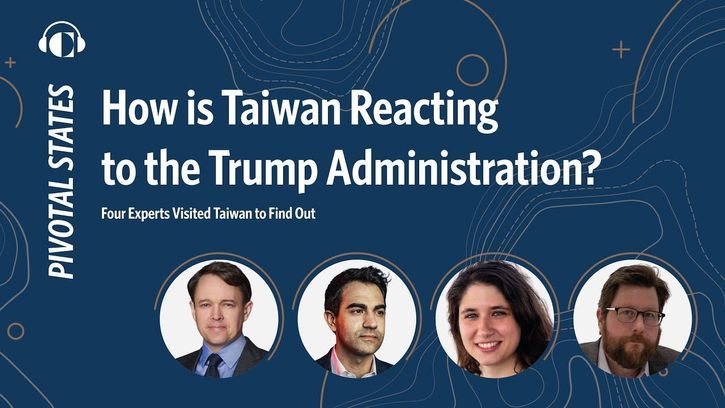
What’s Old, What’s New in American Foreign Policy?
We’ve been looking back at history to understand our present—and surveying a rising generation to understand our future foreign policy.
Dear Friends,
What’s old and what’s new in American foreign policy?
At a time like this, it’s more important than ever to view the unfolding of American Statecraft with the benefit of historical perspective. We’ve been looking back at history to understand our present—and surveying a rising generation to understand our future foreign policy.
Asia
Last month, I traveled to Taipei with two Statecraft colleagues — Stephen Wertheim and Brett Rosenberg — along with our former colleague, Matt Duss, to understand how Taiwan’s leaders are reacting to Trump and our current strategic environment. Many we met in Taipei seemed certain that conflict was inevitable. But is it?

In Taipei, Stephen’s recent Foreign Affairs article on how to avoid a war with China in the event of a Taiwan crisis was also the talk of town.
Serious diplomatic engagement remains essential— not just to avoid conflict, but to disrupt China’s growing ties with other U.S. adversaries. In an article on cooperation between China, Russia, Iran and North Korea in Foreign Affairs, I argue against a strategic mindset of inevitability. We might even learn from the U.S. - Soviet détente of the 1970s as a model for forging a more stable relationship with Beijing today.
Europe
In Europe, allies are scrambling to adapt to what they perceive as an America adrift. But in Survival, Stephen reflects that "America has not been seriously committed to the defence of Europe for many decades."
Even so, Trump’s disregard for diplomatic norms, threats to allies like Denmark and Canada, and sidelining of Europe in Ukraine negotiations have all imposed real costs in U.S. - European relations. The damage didn’t start on 20 January 2025, but a great deal has been torn apart, I argue in the same volume, which brings together several contributions from a recent conference we organized on U.S. - European relations.
Middle East
In the Middle East, the Trump administration has now reopened diplomacy with Iran, which has analysts looking back to the 2015 Joint Comprehensive Plan of Action (JCPOA) negotiations.
Statecraft Senior Fellow Aaron David Miller writes in the New York Times that Israel, meanwhile, has emerged as a regional hegemon in the Middle East. Since October 7, it has forged a more unilateral and aggressive security doctrine, developments that may complicate U.S. diplomacy in the region. Yet troubled terrain for U.S. diplomacy in the Middle East is hardly a novel problem, as Aaron is the first to note.
What’s the Real Future of American Statecraft?
We also surveyed Gen Z to find out what this rising cohort thinks of America’s role in the world. We’ve just released the full report: This crucial generation is broadly internationalist but seeks a more modest U.S. role in key policy areas, including relations with Ukraine and Israel.
Dig into the report for lots of other interesting findings, especially on the views of younger Republicans.

Follow us and drop us a line on LinkedIn and X (@CEIPStatecraft). We'd love to hear your thoughts on all things U.S. Foreign Policy.
Best,
Chris Chivvis
Senior Fellow and Director of the American Statecraft Program
NEW FROM OUR PROGRAM
- What Gen Z Thinks About U.S. Foreign Policy
Christopher S. Chivvis, Lauren Morganbesser
[Read in Carnegie]
- Survival: The End of Something
Edited by Dana Allin and Christopher S. Chivvis, featuring an essay by Stephen Wertheim
[Read in Survival]
- Pivotal States Podcast: How Is Taiwan Reacting to the Trump Administration?
Christopher S. Chivvis, Matt Duss, Brett Rosenburg, Stephen Wertheim
[Watch on Carnegie]
OUR FAVORITES FROM YOU
- Considering a US-Supported Self-Defense Option for Taiwan
Charles L. Glaser
[Read in the Washington Quarterly]
- Military Policy Toward China: The Case Against Overreaction
John Mueller
[Read in Defense Priorities]
- Counterpoint: Europe Can Fully Replace the US as Ukraine Chief Protector
Nathalie Tocci, Stephen M. Walt, Host: Sasha Polakow-Suransky
[Listen on Foreign Policy]
Carnegie does not take institutional positions on public policy issues; the views represented herein are those of the author(s) and do not necessarily reflect the views of Carnegie, its staff, or its trustees.